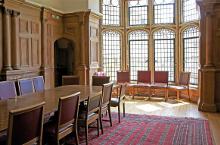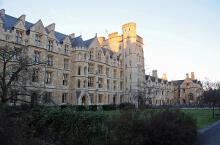King James Bible Translators
JOHN HARMAR
(Harmer)
Personal and Family Life
John Harmar was born in Newbury, Berkshire about 1555. Little is known of his parentage, but he came from a large family with at least one brother, Arthur, and no fewer than four sisters. Though he traveled on the Continent, most of his adult life was spent in Oxford and Winchester. He married Elizabeth Trussell who outlived him. It appears they had no children. He died on 11 October 1613 and was buried under the choir seats in the New College Chapel, Oxford. He left a rather lengthy will bequeathing much of his estate to his wife, brother, sisters, in-laws, nieces, nephews and friends.
Education
He was educated at the William Wykeham School at Winchester (later, Winchester College). In 1572 he became a student at New College, Oxford, graduating B.A. in 1577 and proceeding M.A. in 1582. Years later in 1605 while involved in the Bible translation he became B.D. and D.D.
Career
Early in his life John Harmar came under the patronage of Robert Dudley, the Earl of Leicester who not only assisted him in obtaining an education at Winchester and Oxford, but in 1585 was instrumental in Harmar's obtaining the regius professorship of Greek at Oxford. He held this position for five years. Harmar traveled with Dudley on the Continent where, in Geneva, he attended lectures of the famed reformer, Theodore Beza, and undoubtedly mingled with the Protestant community there. As a result, some years later Harmar published an English translation of Beza's sermons, which he dedicated to Dudley. During his European travels, he had the opportunity to participate in religious debates with Catholic theologians in Paris.
In 1586 Harmar was responsible for the first Greek book printed at Oxford. It consisted of several sermons of John Chrysostom, the early Church Father. Harmar took on the duties of headmaster at his alma mater, Winchester College in 1588 and served until promoted to warden of the college in 1595, a position he held until his death. Ecclesiastically, he was a prebendary of Winchester Cathedral and rector of Compton and Droxford, Hampshire. Of course, in 1604 he was invited to become one of the Translators.
John Harmar and the Translation
John Harmar was a member of the Second Oxford Company responsible for translating the Gospels, the Acts of the Apostles, and the book of Revelation. Many of the earliest available scriptural texts providing the basis of the new translation were written in Greek, and other sources that were important to consult were written in Latin. It was altogether fitting that Harmar, who had been called a "most noble Latinist and Grecian", be a member of the team.
John Harmar not only devoted four years of intense effort to this task, but at the conclusion of the translation he was one of three known men who were asked to serve on the committee of reviewers and revisers of the whole. The others we know who shared this task were John Bois and Andrew Downes. These men went through the entire Bible, checking the translation, resolving issues raised by the companies, and spotting concerns arising for the first time and dealing with them. This review in which John Harmar was a major player took nine months to complete according to John Bois. The painstaking effort it required is reflected in Bois' notes. The resultant translation owes much to their effort.
Bio Bits
John Harmar's friend and patron Robert Dudley, the Earl of Leicester (1532-1588) was in a position perhaps like no other to advance John's fortunes. Robert was the life-long friend and often rumored ‘husband-in-waiting' of Queen Elizabeth. He and Elizabeth had been childhood playmates, and were in the Tower of London at the same time. Dudley was awaiting execution for his part in the attempt to put Lady Jane Grey on the throne, and Elizabeth by order of her half-sister, Queen Mary. Fortunately for Robert Dudley and John Harmar the order for his execution was rescinded. Under Queen Elizabeth he became one of England's most influential men. Dudley was a Puritan in his religious views, but not intolerant of others' religious positions. In 1564 he was made chancellor of Oxford and remained so until shortly before his death in 1588. As chancellor and friend of the Queen, he was in a unique position to help Harmar. How he came to be favored by Dudley is unknown.


